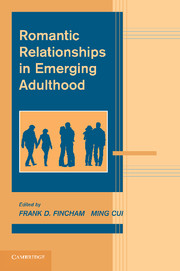Book contents
- Frontmatter
- Contents
- List of Contributors
- Foreword
- PART I INTRODUCTION
- PART II CONCEPTUAL AND METHODOLOGICAL FOUNDATIONS
- PART III THE DEVELOPMENTAL CONTEXT OF ROMANTIC RELATIONSHIPS IN EMERGING ADULTHOOD
- 6 Intergenerational Continuities in Economic Pressure and Couple Conflict in Romantic Relationships
- 7 Linking Parental Divorce and Marital Discord to the Timing of Emerging Adults' Marriage and Cohabitation
- 8 Family Differentiation in Emerging Adulthood: The Role of Romantic Relationships
- PART IV RELATIONSHIP PROCESSES IN EMERGING ADULTHOOD
- PART V PRACTICAL IMPLICATIONS
- Index
- References
8 - Family Differentiation in Emerging Adulthood: The Role of Romantic Relationships
Published online by Cambridge University Press: 06 December 2010
- Frontmatter
- Contents
- List of Contributors
- Foreword
- PART I INTRODUCTION
- PART II CONCEPTUAL AND METHODOLOGICAL FOUNDATIONS
- PART III THE DEVELOPMENTAL CONTEXT OF ROMANTIC RELATIONSHIPS IN EMERGING ADULTHOOD
- 6 Intergenerational Continuities in Economic Pressure and Couple Conflict in Romantic Relationships
- 7 Linking Parental Divorce and Marital Discord to the Timing of Emerging Adults' Marriage and Cohabitation
- 8 Family Differentiation in Emerging Adulthood: The Role of Romantic Relationships
- PART IV RELATIONSHIP PROCESSES IN EMERGING ADULTHOOD
- PART V PRACTICAL IMPLICATIONS
- Index
- References
Summary
The transition from adolescence to adulthood lasts several years and is generally seen as a potential time of personal growth and exploration. According to Arnett (2004, p. 3) “from their late teens to their late twenties they [emerging adults] explore the possibilities available to them in love and work, and move gradually toward making enduring choices.” Within this framework, the scientific literature has recently begun to address the role of the family of origin during a period of the life cycle that, in past decades, had received little attention.
According to Tanner (2006), a recentering process occurs during emerging adulthood, as young people progress from the dependence of adolescence toward adult roles and responsibilities. A primary issue in this process concerns the strength and meaning of the relationship between parents and children. This recentering process involves not only a change in the relationship with parents but also an increasing relevance of other close, voluntary relationships. Romantic relationships become increasingly more central, although parents continue to be a reference point for advice and support (Collins & Laursen, 2000; Collins & van Dulmen, 2006).
This chapter provides an overview of the role of the family of origin during emerging adulthood, focusing on the construct of family differentiation. After describing this construct, we present two cross-cultural studies comparing the influence of different features of family differentiation in early stages of emerging adulthood. To render the results of these studies intelligible, we briefly outline comparative demographic data.
- Type
- Chapter
- Information
- Romantic Relationships in Emerging Adulthood , pp. 142 - 166Publisher: Cambridge University PressPrint publication year: 2010

